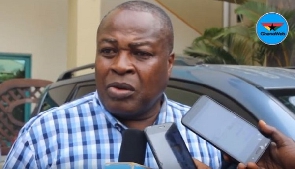Correspondence from Eastern Region:
The American Ambassador to Ghana, Stephanie S. Sullivan, through her special “Ambassador’s Self Help Programme”, has assisted once inoperable Community-based Health Planning and Services (CHPS) compound at Klo Djekiti to start functioning.
But for her swift and timely assistance, the CHPS compound would still have been sitting unused since almost every equipment in the facility was donated by Ambassador Sullivan under her special self-help programme.
As a result of Ghanaweb’s report in April, the newly built CHPS compound, which was rendered useless due to lack of electricity, water and health equipment needed to deliver healthcare to Klo Djekiti community in the Lower Manya Krobo Municipality, is now functioning fully to the benefit of the rural folks.
Nine more adjoining communities including Anummako, Akomakompa, Oguenya, Otsitsee, Yongosisi, Trawa, Ketem, Patsunya and Gbagblam are also giving a sigh of relief since they can now get access to healthcare; something they had lacked since Adam.
In an interview with the in-charge of the Klo Djekiti CHPS compound, Ms. Salomey Okpoti, she expressed joy for seeing the facility functioning at last.
“Working at this CHPS (compound), I feel happy. This CHPS has been the dream of the people for a very long time now and now it is here and it is working. In fact, it is an achievement,” she said.
Ms. Okpoti narrated the ordeal she and her colleagues went through to bring healthcare to the people of Klo Djekiti and the other surrounding communities and indicated that due to the non-functioning of the facility at the time, they (the health workers) had to live far away at Oborpa and traverse the deplorable road on a motorbike periodically to render healthcare to the community.
“…but now with the CHPS compound here at Djekiti, working is very easy and being with the community members, whatever thing you need, it is just easy to go to them. And now the distance is not that much compared to before and in terms of the outreach services, the distance is quite shorter now,” she expressed.
The health worker further disclosed that, “When we started, the Municipal Assembly gave us two tables and four chairs to begin with. Then, an NGO came in, which is the US Ambassador’s Special Self Help and they also brought a lot of things…benches, tables, chairs, beds, a place to store our drugs, a bed for our family planning services and ANC services. Then we have shelves where we keep our folders. Then a fridge which we use for ice packs to condition our vaccines.
“Then…since there is no electricity in the town, we have solar which we use to charge our phones. Then we have other things still there which have not yet been donated to us to use. We have two veronica buckets as well, all from the US Ambassador’s special help.
“So, you can see that with most of the things the US Ambassador brought, without them we couldn’t have managed because we needed a lot of things; and being a new facility they have really helped us with the things they brought. And there are still many things there they are yet to hand over to us so that we can have access to them. So we really appreciate their efforts.”
Construction of the CHPS compound which was provided through advocacy by SEND GHANA, an NGO, under its “People for Health Project”, was completed in June 2019, but it was not in use because of the unavailability of equipment and amenities.
The Djekiti community had been without a health facility for many years, a situation which compelled the residents to commute over 6 kilometres on very deplorable roads to Oborpa or Krobo Odumase to access a nearby health facility.
According to some of the residents who spoke to Ghanaweb, lack of the health facility created a lot of inconveniences for them, especially pregnant women and children, since it was difficult for them to transport the sick or women in labour on a motorbike through the rough road.
“Now we are happy our clinic has started working and it is helping us a lot,” one of the residents said.
Ms. Salomey Okpoti however mentioned some challenges that need urgent attention to enhance healthcare delivery in the community.
“We still face some challenges around. The first one is the water problem. If you look around we have a borehole there but it is not functioning. We only depend on rain water. Community members fetch water for us but sometimes it is quite difficult getting them to bring the water. We don’t have a poly-tank to save the water as well.
“The lighting system is a problem. There is no light in town. The US Ambassador brought us a solar system but that one is not enough to generate power for the whole facility. so, we are in darkness now.
“Then again we don’t have a toilet facility for patients coming in. In case we have a person with diarrhoea we will find it difficult for them to feel comfortable,” she said.
Ms. Okpoti appealed for a poly-tank and a higher voltage solar panel to connect the CHPS compound to electricity as well as a lavatory for the patients.
Ghanaweb also observed that telecommunication network signal is so weak in the community to the extent that community members and the health officers have to climb hills, tables and most times raise their mobile phones up before they can access signals to make calls. A situation which can hamper smooth healthcare delivery in times of emergencies.
Click to view details



Health News of Monday, 14 December 2020
Source: www.ghanaweb.com

















